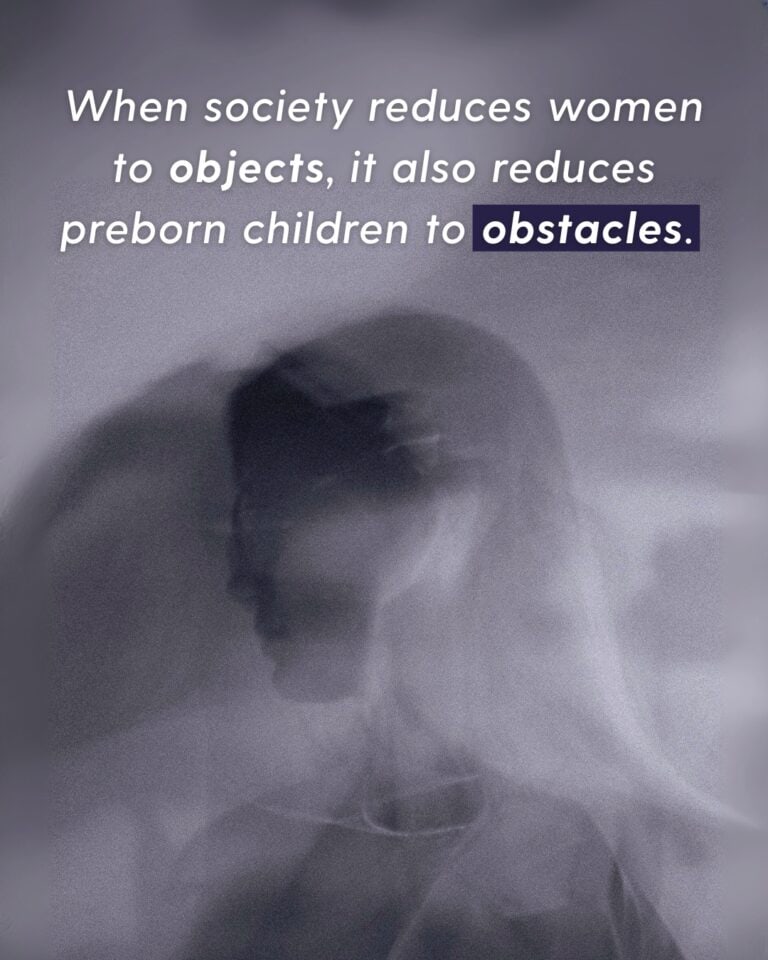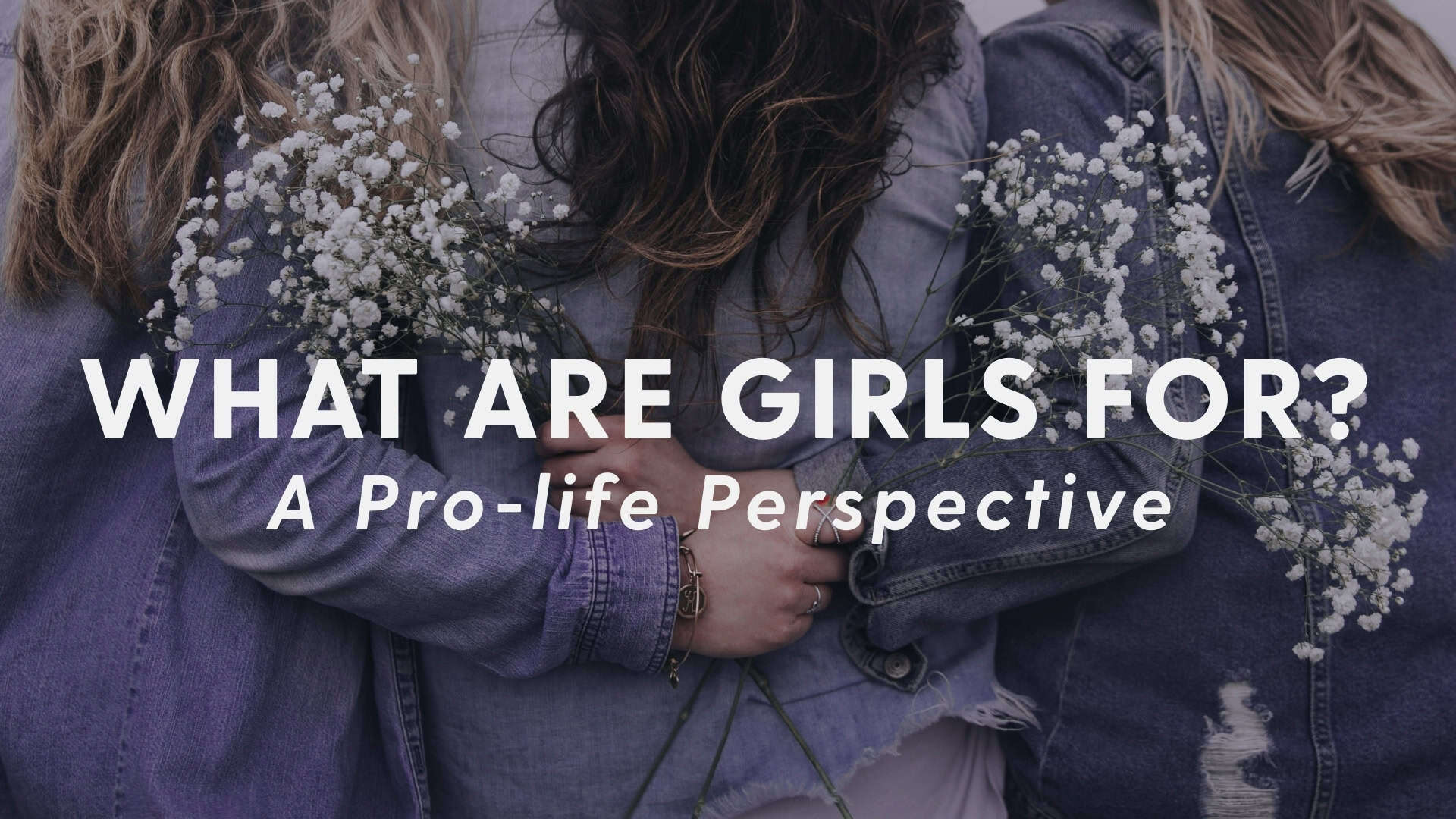While scrolling through the various movie options available one Saturday evening, I stumbled across a thought-provoking thriller. Left with limited selections to fulfill my movie-night wishes, I watched the flick, which left me with a profound inquiry to ponder. One of the main female characters in this film asks, “What are girls for?” The question itself immediately raises one’s hackles, suggesting that girls only have utilitarian value. After digesting it for some time, however, I realized that at its core, the question dives into the essence of identity, value, and purpose. This led me to consider how a girl’s identity may affect her decision to abort.
Abortion is a complex issue in our society, not black and white. We must consider what leads girls to walk into abortion clinics in the first place. Why do girls choose abortion?
Nobody walks into an abortion clinic without a story, belief, or experience that led them there. At its root, abortion forces us to confront foundational questions about who we are, what we value, and how we define human worth. It especially affects girls as we have the unique ability to carry and deliver life.
While it’s a futile feat to try and explain the entirety of a woman’s worth in one article, I will aim to highlight some of the truths and lies about womanhood in relation to abortion.
What Are Girls Not For?
Despite the beautiful and unique design of women, we live in a world where it can feel impossible to be a girl (queue America Ferrera’s “Barbie” monologue). Regardless of the world’s mixed messaging about femininity, one thing always remains true: women are created by a loving God who desires relationship with us. By accepting God’s gift of salvation through Jesus Christ, girls can step into what they were created for and the fullness of who they are. But this world is loud, and the mixed messaging of femininity can cause confusion. With that said, we must also recognize and refute some common fallacies associated with girlhood. Before we get into what girls are for, let’s first clarify what girls are not for…
Girls Are Not For Objectification
“Do not let your adorning be external—the braiding of hair and the putting on of gold jewelry, or the clothing you wear—but let your adorning be the hidden person of the heart with the imperishable beauty of a gentle and quiet spirit, which in God’s sight is very precious.” – 1 Peter 3:3-4
The thought-provoking thriller I watched tells the chilling true story of a serial killer who appeared as one of three contestants on a dating game show. Unaware of his dark past, the main female character asks each hidden bachelor the same set of questions, choosing her match based solely on their answers. That’s just the problem, though — their answers. After asking, “What are girls for?” bachelor #1 answers, “Girls are for… guys and… you know, having fun with.” While this movie is set in the late 70’s, his answer reflects the still prevalent diagnosis of our society that leads women to seek abortion in the first place – Objectification.
One of the biggest lies that fuels the abortion mindset is the idea that a girl’s body exists for someone else’s pleasure, expectations, or convenience. Objectification reduces a person to a body, function, or feeling. When girls grow up being told that their worth lies in how they look, what they offer sexually, or how well they fit into someone else’s plan, it shapes how they see themselves and others. This objectivation fuels a culture of abortion in three ways:
- If a woman believes her worth lies only in her body, she may see abortion as her only form of control.
- If she views herself as an object for someone else’s pleasure, she may feel pressured to “fix” a pregnancy by ending it.
- When society reduces women to objects, it also reduces preborn children to obstacles.
In our culture, women are often celebrated for their beauty, sex appeal, and charm—traits that billion-dollar industries like beauty, diet, and porn continue to exploit. Even in certain religious circles, women are reduced to roles centered solely on male pleasure (more on this later). Many girls believe that they are unlovable without a desirable physical appearance and sexual approval. Breaking from this cycle can be especially difficult after premarital sexual intimacy, as the brain often confuses being physically desired with being loved.

Pregnancy complicates this false perception of feminine self-worth. Babies are seen as obstacles, and the fear of changing bodies, rejection, or abandonment can be overwhelming—especially when we tie value to physical appeal. But real love doesn’t demand that we erase ourselves or our children. When girls reject objectification and embrace their true worth in Christ, their identity is no longer measured by appearance but by divine design. Character is beautiful – and doing the right thing even when it’s difficult is precious in the eyes of God.
A woman’s beauty is meant to be cherished, not objectified, and her ability to nurture life is not a burden—it’s an extension of her glory. She doesn’t have to strive for love through external means because she is already loved. Neither women nor preborn children are disposable; both are uniquely created, worthy of love and respect.
Girls Are Not For Deception
“For among them are those who creep into households and capture weak women, burdened with sins and led astray by various passions, always learning and never able to arrive at a knowledge of the truth.” – 2 Timothy 3:6-7
Since the beginning of time, Satan has hated the distinctiveness of women. When examining the fall of man in Scripture, you may ask yourself, “Why didn’t Satan initially trick Adam?” Because he knew that Eve had a unique power. She is quite literally “the mother of all the living” – possessing the power to create and influence life. Satan exploited her unique role. He’s the great deceiver, still twisting what God made good to weaken our power.
When the main character of the thriller asks, “What are girls for?” the serial killer responds, “That’s up to the girl”—a deceptive answer designed to gain trust while hiding his intent to harm. The enemy uses the same strategy through modern feminism and the abortion industry. Under the guise of caring for women, these perverted systems tell girls — explicitly and implicitly — that motherhood is oppression, pregnancy ruins dreams, and abortion is freedom. These narratives mask the truth: that a woman’s ability to carry and nurture life is not a burden, but a profound power. As Glenn T. Stanton says, “What feminists failed to grasp was how a woman’s ability to present the next generation of humanity to the world might not actually be a weakness, but rather an immoderate power.”
Imagine this all-too-common scenario: A young woman becomes pregnant and is abandoned. Scared and alone, she doesn’t know where to turn. In her vulnerability, she is told that abortion will solve the problem. Instead of being met with support, resources, and encouragement, she’s told that not only is it her right to choose abortion, but she should choose abortion given her circumstances. That’s not support—it’s further deception.
Every day, thousands of women undergo abortion, removing not just their child, but part of their identity. Abortion leaves countless girls feeling alone, wounded, and emotionally and physically scarred. No, not every woman is called to bear children—but every woman deserves the truth: that the ability to give life is not a curse, but a divine strength. And that strength should never be stolen through deception.
Girls Are Not For Subjugation
“God created man in his own image,
in the image of God he created him;
male and female he created them.” – Genesis 1:27
God created man and women in his image. One is not superior, domineering, or better than the other. You may be thinking, “Doesn’t Scripture say that wives are to submit to their husbands?” Yes, it does, specifically in Ephesians 5:22-23. But there are clear distinctions between biblical submission and subjugation.
Submission Vs. Subjugation
First and foremost, subjugation is “the act or process of bringing someone or something under one’s control.” It’s synonymous with “conquest” and “domination,” which is hardly what God intended when creating the sanctity of a marriage between a man and a woman. In fact, marriage is supposed to mirror Jesus and His relationship with the church. Biblical submission is not about control or abuse, rather it means mutual love through showing honor, respect, and kindness. In the words of Ginger Kolbaba, “Biblical submission is about treasuring the other person who is created in the image of almighty.”
Unfortunately, biblical submission has been wrongly twisted into a tool for coercing and controlling women and their bodies.
Legalism and Subjugation
If you grew up in the late 90s or early 2000s, you may have experienced a wave of Christian teaching that strongly emphasized abstinence in response to rising teen pregnancy rates, the AIDS epidemic, and growing concern over premarital sex. While rooted in good intentions, these teachings often became overly legalistic, leading to harmful messaging—especially for girls. Many were taught to see themselves primarily in relation to male desire, shaping how they dressed, behaved, and understood their worth.
In these legalistic narratives, men are taught that their sexual urges are nearly impossible to control, while women possess no sex drive. This mindset shames girls for having sexual desires while placing the burden on them to manage male impulses, unfairly reducing men to unrestrained libertines. The resulting sexual responsibility placed on girls influences legalistic expectations for dating and modesty that have little to no Scriptural credence. Girls are also encouraged to idolize their virginity, making sexual purity a measure of spiritual and moral value.
This legalistic ideology sends a message of subjugation to girls, fueling a culture of abortion in two prevalent ways:
- Girls in the church who get pregnant out of wedlock often feel deep shame, leading some to choose abortion out of fear.
- Men are enabled to avoid sexual responsibility, which can leave girls isolated and driven to abortion.
This topic is incredible relevant as more than 4 in 10 women who have had an abortion were churchgoers when they ended a pregnancy. Additionally, a BMC Women’s Health study found that 31% of women seeking abortions cited partner-related reasons. These stats reveal a convicting reality: the church has an opportunity for growth. Women facing an unexpected pregnancy should be met with grace through their churches, not rejection. A culture that reduces women to objects also robs men of the chance to rise up as the protective, honorable leaders and fathers they can be. In extreme cases, it shifts the blame for sexual assault onto women, suggesting they provoked it – a concept nowhere to be found in Scripture.
The Solution to Subjugation
If the church encouraged responsibility and rallied around these women, abortion could become unthinkable. We need to teach girls that physical and sexual modesty aren’t concepts created for subjugation, rather they honor the sanctity of our bodies – a reality that cannot be lost or earned. The female body isn’t a measure of worth or a stumbling block for men—it’s a divine design we honor through our clothes, diet, sexuality, and more. You deserve food. You deserve respect. Your body is a temple – not because of what it can do for others, but because of the one who made it.
It is also worth recognizing that not all men or Christians see girls in a subjugated light. In fact, there are countless of stories of both men and the church stepping up to support abortion-minded women, ultimately leading to a choice for life. However, this type of sexism is not completely absent from modern society, both religiously and secularly. Girls deserve respect and support, not subjugation.
What Are Girls For?
Now that we have exposed and refuted misconceptions about the role of girls, we can finally get to the main question of the hour – What are girls for?
Girl Are For Becoming
“And I am sure of this, that he who began a good work in you will bring it to completion at the day of Jesus Christ.” – Philippians 1:6
Girls, like all people, are works in progress—God is still shaping us. While not every woman is called to a physical motherhood, every woman is made to grow into her unique purpose. In a culture that ties worth to perfection, success, and appearance, that process is often crushed. Girls feel pressured to have it all together, and an unexpected pregnancy can feel like a threat to that image. Abortion is seen as a pressure-filled “solution” when a girl feels she must be successful, secure, or ready for the future.
But “girls are for becoming” reminds us: She doesn’t have to be ready for everything, but she must be supported as she grows.
What if we told girls that they can become mothers and still follow their dreams, even if it looks different than they planned? What if we told girls that they can be spiritual mothers and sisters to those around them? What if the world allowed girls to be imperfect, incomplete versions of themselves and helped them step into their fullness along the way?

Abortion doesn’t support girls in becoming, it limits them, ending a new process of life for both her and her preborn child. Abortion tells girls that they can’t – a stark contradiction to the female empowerment messaging found in Scripture. In a world where girls are allowed to become, they can:
- Say “yes” to life without saying “no” to their future.
- Say “no” to objectification, deception, and subjugation.
- Grow through hard things and come out stronger.
- Seek and ask for help.
But how can we practically support women in becoming, especially when faced with an unexpected pregnancy? One of the many answers lies in the honorable and gracious work of pregnancy resource centers. Pregnancy resource centers provide women in unexpected pregnancies with the resources and help they need to choose life. They present girls with more options than just abortion, supporting them through all decisions.
Overall, to make abortion unthinkable, we must create a culture that doesn’t demand perfection from women. We must tell girls: You are allowed to be in a process. You are allowed to become. And so is the child within you.
Additional Resources:
- See Life – A Focus on the Family Ministry that provides a way for churches, medical professionals, and businesses to connect with their local pregnancy centers to support lifesaving services.
- Option Ultrasound – A Focus on the Family Ministry that provides various grants that help fund pregnancy centers across America.
Girls Are For Love and Community
“Greater love has no one than this, that someone lay down his life for his friends.” – John 15:13
While doing research for this article, I asked some friends the simple but compelling question: What are girls for? Answers ranged from “motherhood” to “submission,” but my favorite came from a good friend who said, “My girls keep me sane.”
God designed girls for love and community. Ecclesiastes 4:9–10 reminds us of this reality, saying, “Two are better than one… For if they fall, one will lift up his fellow.” There’s a reason why solitary confinement is a form of criminal punishment. Our brains are made to be in community with each other, a reality that was laid out with Adam and Eve.
Jesus modeled the power of holy community through his friendship with the disciples. On the eve of his crucifixion, he expressed his deep love for them in John 15:13. Through his actions and words, he shows us what real love and community look like: sacrifice. Love stays even when plans fail and/or life gets tough. It endures, supports, and sacrifices.
A recent study found that one in four women described their abortions as unwanted or coerced. Additionally, a 2023 study of 1,000 post-abortive women found that 60% of them sought abortion due to a lack of emotional and financial support. These aren’t just numbers—they’re a call to action. Women in crisis need more than opinions; they need love, and a community willing to show up and sacrifice for them through the journey of an unexpected pregnancy.
Girls Are For Abundant Life
“The thief comes only to steal and kill and destroy. I came that they may have life and have it abundantly.” – John 10:10
I recently attended a pro-life event in Boulder, CO – a city notorious for late-term abortions. The event was held at a local Catholic church, which hosted a graveyard dedicated to the fetal remains of about 5,500 aborted babies. Small plaques lined the memorial wall with words of remembrance for babies lost to abortion, miscarriage or stillbirth. “With love and profound regret,” “My beautiful baby – I’m sorry,” and “I failed to protect you. Forgive me. Love, Dad,” were just a few of the dozens of plaques reflecting the heart break of abortion. One of the most convicting plagues read, “A part of me died, too.” Women seek abortions to have the life taken from them, and that’s exactly what it does to both her and her child.
The devastation of this reality should concern everyone, especially believers. God didn’t want this for us. Fighting abortion isn’t just about the preborn, it’s about the reality of women being blindsided by an internal death. Yes, healing is possible—many women walk through post-abortive grief with counseling and prayer. But the notion that abortion is a solution to a problem is war against women.

Girls – we’re made for an abundant life. Women have the unique, powerful ability to create life, which can be expressed in many ways, including motherhood, adoption, or even community support. An abundant life means that girls bring life into the world through beauty, strength, courage, love, and motherhood—both physical and spiritual.
The testimony of Esther in the Old Testament is a great example of this biblical femininity. Having been forced into marriage, her story reveals that abundance isn’t about comfort or subjugation—it’s about purpose. With courage and faith, she risked her life to save her people, and in doing so, brought life to future generations. That same strength, beauty and purpose is possible for every girl.
An abundant life isn’t always easy, but all of us were made for it—and we can choose it through Jesus Christ. Abortion offers a quick escape, but it often steals the very abundance it promises to preserve for noth women and men. Choosing life doesn’t mean things will be perfect, but it keeps the door open for growth, healing, nurturing and a future filled with unexpected meaning.
A Closing Note…
As I close this article, I’d like to take a moment to recognize all women, including post-abortive, those considering abortion, foster moms, adoptive moms – whatever the case may be. It is one thing to read about your worth, but it is another thing to know it in your heart. All girls are beautiful, not because of what they have to offer, but because of who created them.
If you resonate with any part of this article, I encourage you to pray this prayer with me:
Dear God,
Thank you for how you’ve made me. You have created me fearfully and wonderfully, and you say I am chosen.
I pray that you would help me see my unique beauty and gifting. I pray that in times of fear, heartache, and hardship, you would meet me and remind me of Your love. Please fill me with Your peace that surpasses all understanding.
Lead me to the right community and resources to step into what you have called me to do. Make your presence known to me along the way. Guide me in your goodness, for I know you have good plans for me.
I pray this over all the girls around me. In you, there is fullness of life. My soul longs to experience it. Help me step into who you say I am.
-Amen.















